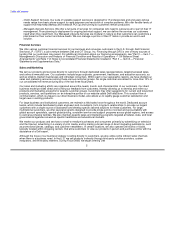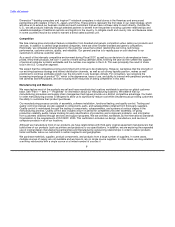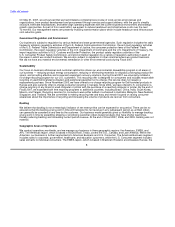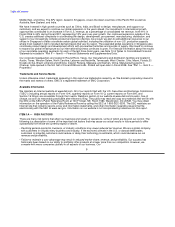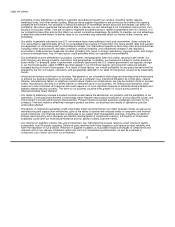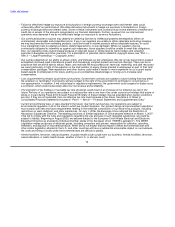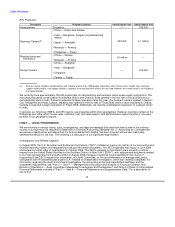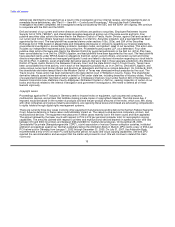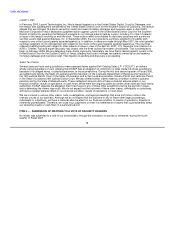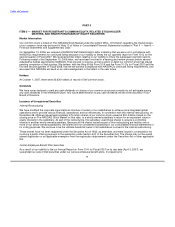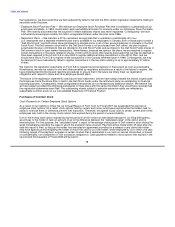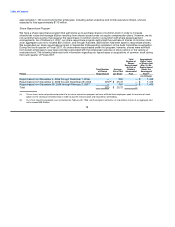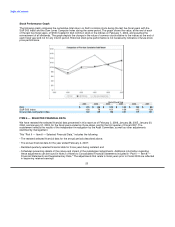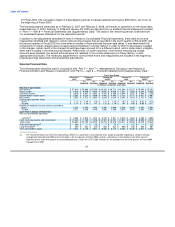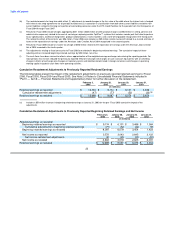Dell 2006 Annual Report Download - page 15
Download and view the complete annual report
Please find page 15 of the 2006 Dell annual report below. You can navigate through the pages in the report by either clicking on the pages listed below, or by using the keyword search tool below to find specific information within the annual report.
Table of Contents
• Failure to effectively hedge our exposure to fluctuations in foreign currency exchange rates and interest rates could
unfavorably affect our performance. We utilize derivative instruments to hedge our exposure to fluctuations in foreign
currency exchange rates and interest rates. Some of these instruments and contracts may involve elements of market and
credit risk in excess of the amounts recognized in our financial statements. Further, revenue from our international
operations may decrease if we do not effectively hedge our exposure to currency fluctuations.
• Our continued business success may depend on obtaining licenses to intellectual property developed by others on
commercially reasonable and competitive terms. If we or our suppliers are unable to obtain desirable technology licenses,
we may be prevented from marketing products, could be forced to market products without desirable features, or could
incur substantial costs to redesign products, defend legal actions, or pay damages. While our suppliers may be
contractually obligated to indemnify us against such expenses, those suppliers could be unable to meet their obligations.
Also, our operating costs could increase because of copyright levies or similar fees by rights holders and collection
agencies in European and other countries. For a description of potential claims related to copyright levies, see "Part I —
Item 3 — Legal Proceedings — Copyright Levies."
• Our success depends on our ability to attract, retain, and motivate our key employees. We rely on key personnel to support
anticipated continued rapid international growth and increasingly complex product and service offerings. There can be no
assurance that we will be able to attract, retain, and motivate the key professional, technical, marketing, and staff resources
we need, particularly in light of the reduction in the total number of equity shares granted to employees as part of their total
compensation packages. New regulations and other factors could make it harder or more expensive for us to grant equity-
based awards to employees in the future, putting us at a competitive disadvantage or forcing us to increase cash
compensation.
• Loss of government contracts could harm our business. Government contracts are subject to future funding that may affect
the extension or termination of programs and are subject to the right of the government to terminate for convenience or
non-appropriation. In addition, if we violate legal or regulatory requirements, the government could suspend or disbar us as
a contractor, which would unfavorably affect our net revenue and profitability.
• The expiration of tax holidays or favorable tax rate structures could result in an increase of our effective tax rate in the
future. Portions of our operations are subject to a reduced tax rate or are free of tax under various tax holidays that expire in
whole or in part during Fiscal 2010 through Fiscal 2019. Many of these holidays may be extended when certain conditions
are met. If they are not extended, then our effective tax rate could increase in the future. See Note 4 of Notes to
Consolidated Financial Statements included in "Part II — Item 8 — Financial Statements and Supplementary Data."
• Current environmental laws, or laws enacted in the future, may harm our business. Our operations are subject to
environmental regulation in all of the areas in which we conduct business. Our product design and procurement operations
must comply with new and future requirements relating to the materials composition of our electronics products, including
restrictions on lead, cadmium, and other substances. On July 1, 2006, the European Union adopted the Restriction of
Hazardous Substances Directive. The labeling provisions of similar legislation in China became effective on March 1, 2007.
If we fail to comply with the rules and regulations regarding the use and sale of such regulated substances, we could be
subject to liability. Beginning in August 2005, we became subject to the European Union Waste Electrical and Electronic
Equipment Directive as enacted by individual member states of the European Union ("WEEE Legislation"). The WEEE
Legislation makes producers of electrical goods, including computers and printers, responsible for collection, recycling,
treatment, and disposal of recovered products. While we do not expect that the impact of these environmental laws and
other similar legislation adopted in the U.S. and other countries will have a substantial unfavorable impact on our business,
the costs and timing of costs under environmental laws are difficult to predict.
• Armed hostilities, terrorism, natural disasters, or public health issues could harm our business. Armed hostilities, terrorism,
natural disasters, or public health issues, whether in the U.S. or abroad, could
12





